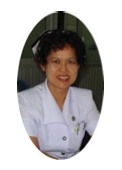2010年4月16日第1回国際ワークショップAbstract Mrs. Siriluck Chandrema
日時:2010年4月16日(金)15:00-17:30
場所:AA研小会議室(302号室)
発表者:Mrs. Siriluck Chandrema (HIV/AIDS expert nurse, HIV Coordinator,ARV Clinic, Hatyai Hospital)
発表題目:" Mobilizing HIV/AIDS situation in southern Thailand:Multidisciplinary approach for Holistic Prevention and Care A case study ofThe Holistic Care Center, Hatyai Hospital, Southern Thailand"
Hatyai Hospital is the 640 beds Regional Hospital, locates in Southern part of Thailand. In 2009 there were 1,929 HIV/AIDS clients, 1,552 cases received ARV used HAART (Highly Active Antiretroviral Therapy). The Holistic Care Center (The HCC), Hatyai Hospital was established and has taken care of persons living with HIV/AIDS both adults and children for more than 10 years. There are 516 Naive clients from HIV/AIDS Clinic (HOPE Clinic) which run by the Holistic Care Center. The main purposes of services at The HCC were to reduce HIV-related morbidity and mortality, reduce opportunistic infection, improve quality of life (QOL), restore and/or preserve immunological function, maximize the duration for suppression of viral load,empower and promote self care, run HOPE self help group, and build network care term. HIV/AIDS care team composes of one medical doctor, two pediatric doctors, HIV coordinator (HIV/AIDS expert nurse), counseling nurses, ARV nurses, pharmacists, medical and pediatric ward nurses, social worker, medical laboratory technologist, PWLH (persons living with HIV/AIDS) volunteers, and community advisory board. The main activities at The HCC included: 1) Providing HIV/AIDS treatment and care, run Counseling Clinic, ARV Clinic, using client center approach, there are many flexible ways to access to ARV clinic: clients can select time/ place to F/U and the staff deliver drugs by postbox or motorcycle. The HCC also do home visit, self help group, camp for HIV/AIDS groups, coaching career, non-formal education for pediatric clients and so on, 2) Being the training center for doctors, nurses and public health officer, 3) Acting as co-researcher/ researcher, 4) Running health prevention & promotion activities: AIDS/STI education and knowledge management: Clinical HIV/AIDS guideline, produce books/ mass media information, and managing health promotion Program for HIV/AIDS clients, 5) Being HIV/AIDS & ARV consultant and being the main referral HIV/AIDS center. Outcomes: Recently,
we distributed new HIV/AIDS and TB guideline and train all staff at Hatyai hospital and community network hospitals. Generally, the impact of all effort we have done, it could reduced morbidity and mortality , reduced opportunistic infection , reduced cost of care, increase QOL , HIV infected children can access to Non-formal Education , and the referral system was improved. We can build a strong network community team and PLWH volunteer's team can work harmoniously with staff at the HCC. Clients can access to care easily and have better health status. They can live in their home and feel free to join social activities again by empower and spiritual support of self help group. Clients can empower themselves and received good support from families. From using mass media, used radio and promote campaign in the communities on Valentine day, World AIDS Day, distinguish, to seem to reduce discrimination of people in the nearby communities. Youth seem to understand HIV/AIDS situation better and come to hospital for VCT, condom used rate was increased to 85%. The key success factors of the multidisciplinary team were 1) having strong commitment, 2) sharing ideas and knowledge, 3) working with full participation and having flexible team work, 4) focusing humanize care for clients and families, 5) being good/ active coordinator by APNs nurses, and 6) building team by heart, realizing WIN- WIN situation. Suggestion: need more support, especially manpower and IT support from the fund agency and administrative team to run new various prevention and care projects by collecting data and presenting evidences systematically to the Director in order to ask for more support and move HIV/AIDS and ARV related health policy. Lessen learn: to work effectively with PWLH and their family and all government/ nongovernment sectors we need: 1) to see potentials and seek new ideas for improvement from all sectors, especially PLWH/AIDS, to work as same as we are helping each other to finish making jigsaw, 2) to value power of all sectors, no one better than others, and try to push all effort to work for the sake of clients. We touch clients' Happiness, when PWLH/AIDS have smile faces; this is the real success of the HCC team.

